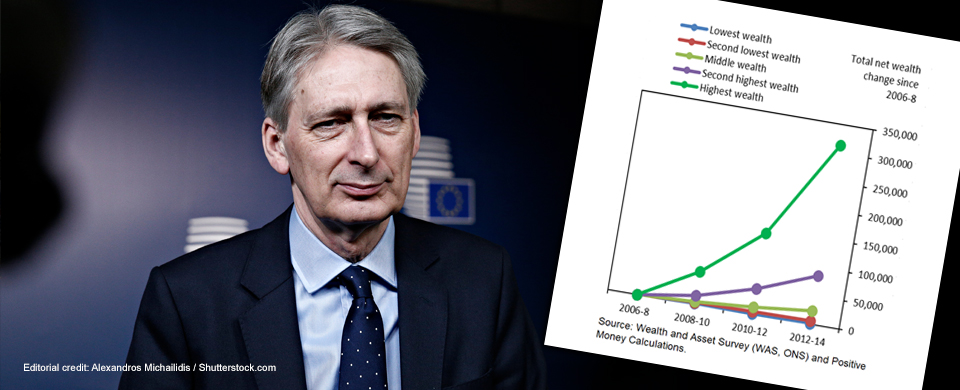Why Hammond’s claim on inequality is a bit rich
Philip Hammond’s claim in his Budget speech this week that ‘income inequality is lower now than under Labour’ was typically slippery.
Many were gob-smacked he could say this after years of austerity alongside tax cuts for big business and the wealthy. But Hammond was basing his claim on flawed government statistics – and even then selecting a measure that hides the extreme inequality between the top one per cent and virtually everyone else.
One of the ways the government tracks inequality is to look at the difference between the average disposable incomes of the top fifth of households and the bottom fifth. This data does show inequality to have fallen from a multiple of six to five.
The fact the differential is relatively low gives a clue to the game being played. What they conceal is that the graph for income inequality is like a rocket taking off: among 95% of households income inequality isn’t that great, but the curve gets steeper as you move into the top 5% and becomes virtually vertical once you reach the top 1%.
The conservative Institute of Fiscal Studies estimates that the top 1% receive more than 8% of all disposable household income – as much as the total for everyone in the bottom 20%.
Meanwhile, a report published by the Chartered Institute of Personnel and Development in June found the mean annual package of a FTSE100 chief executive in 2017 was £5.7m – an amount it would take someone on average pay 195 years to earn.
But even this is not the full story because the super-rich do not earn much – or any – of their income in the form of salary on which tax is deducted at source. It is much easier for them to channel dividends, rent or interest through companies based in tax havens or to move income between financial years to take advantage of tax changes.
This was highlighted by the Resolution Foundation in a report on tracking inequality. It said: “Given that tax data is an imperfect measure of incomes due to tax evasion, researchers and government should aim to quantify the scale of income missing from the UK tax data across the distribution and across time”.
While we wait for this, evidence is mounting to back Labour’s view that inequality is rising rapidly. Because the super-rich earn most of their income from the assets they own, it is reasonable to assume that growing wealth inequality is generating even greater disparities in income.
Why wouldn’t the incomes of the 1,000 people on the Sunday Times Rich List rise by roughly as much as the nearly threefold increase in their wealth over the last ten years? Generally, the rising value of assets such as shareholdings and property is linked to the ‘yields’ they generate in dividends and rent respectively.
Only last week, the Swiss bank, Credit Suisse, reported that “the ranks of UK ultra-rich swelled by 400 last year” taking the total number of people with fortunes of more than $50m to nearly 5,000. This has happened while everyone else saw their wealth, including the home they live in, increase by just 1% to an average of £213,000.
Working people might be able to earn some income from a lodger, but that is never going to narrow the gap with someone who has a fortune of $50m or more and can hide most of it from tax.
Some of the reasons for growing wealth inequality relate to the nature of capital accumulation itself, especially in an economy where most sectors are dominated by what are now called ‘superstar’ firms. But greater inequality has also been driven by neo-liberal economic policy.
Firstly, the £445 billion pumped into the economy by the Bank of England to buy assets from pension funds and banks had the effect of inflating share prices. Quantitative easing, as it was called, was little more than a money making scam for the rich. As leading investment fund manager Neil Woodford admitted, there was no ‘trickle-down effect’ because “the assets that have increased in value are not broadly held by all members of the economy. The asset-rich have got richer but the asset-poor have not.”
Secondly, massive cuts in corporation and capital gains taxes over the last few years have allowed companies to pay out more in dividends and the wealthy to benefit more from rising share and property prices.
And, finally, alongside measures directly favouring the rich, the Tories have shackled trade unions with further restrictions making it harder for them to fight for better wages. The effect of this is that employees have seen their share of GDP fall nearly 20% since the 1970s.
Just as austerity was a Tory political choice, so also were their policies deliberately favouring the rich. That’s why when Hammond falsely claimed that they’ve reduced inequality – in a smug point-scoring way – it was a bit rich, to say the least.
Steve Howell
Steve is a former adviser to Jeremy Corbyn and the author of Game Changer, which tells the inside story of Labour’s 2017 election campaign. In a new 6,000-word postscript for the paperback edition, The Burning Necessity For Change, Steve looks at the issue of inequality in depth.
Game Changer: Eight Weeks That Transformed British Politics, which was published in hardback by Accent Press in April 2018. Order your copy now…
Order a signed hardback copy of Game Changer here (£8.49, inclusive of UK postage). ORDER
Order a signed paperback copy of Game Changer here (£6.99, inclusive of UK postage). ORDER
Order the Kindle version of Game Changer at £1.99 here. ORDER
Game Changer is also on sale in bookshops and via other online channels such as Hive, BooksEtc and Amazon. Shop around: you may find better prices for single copies, but the offer price for two is likely to be the best you can get.

